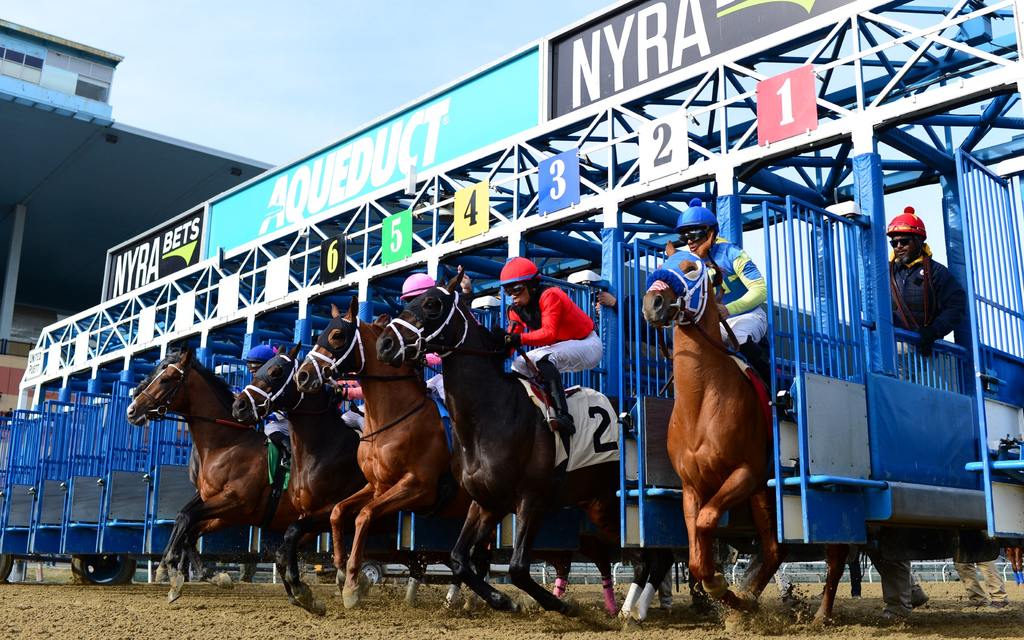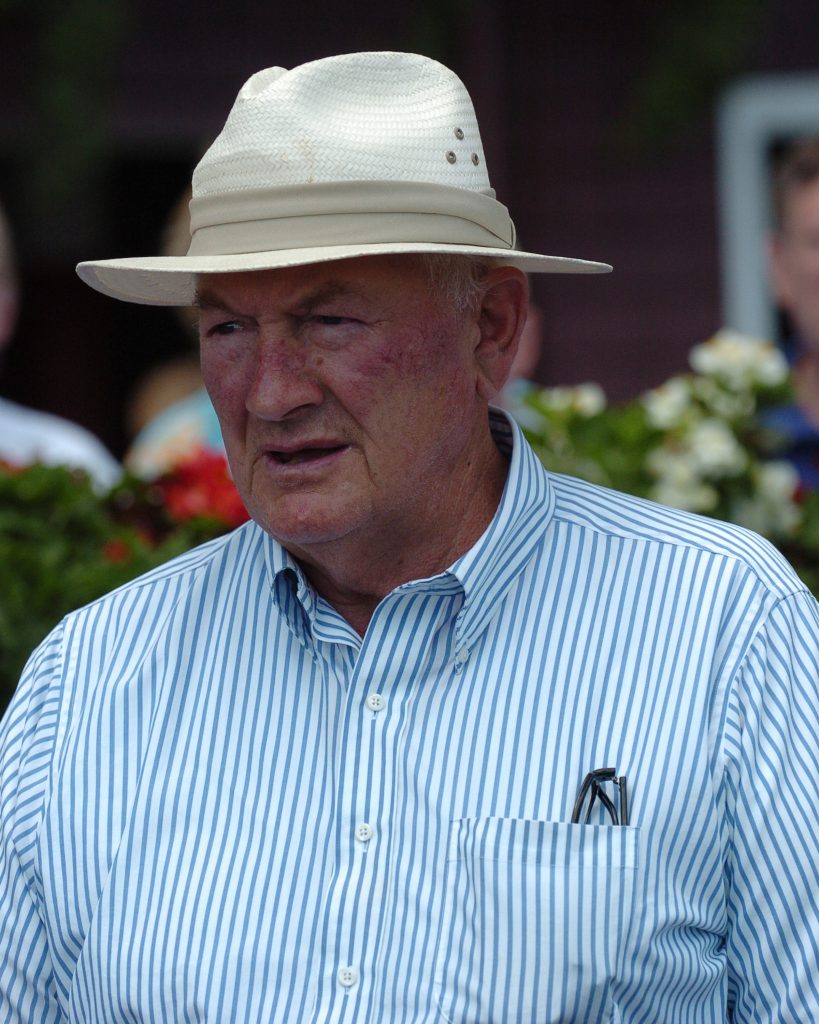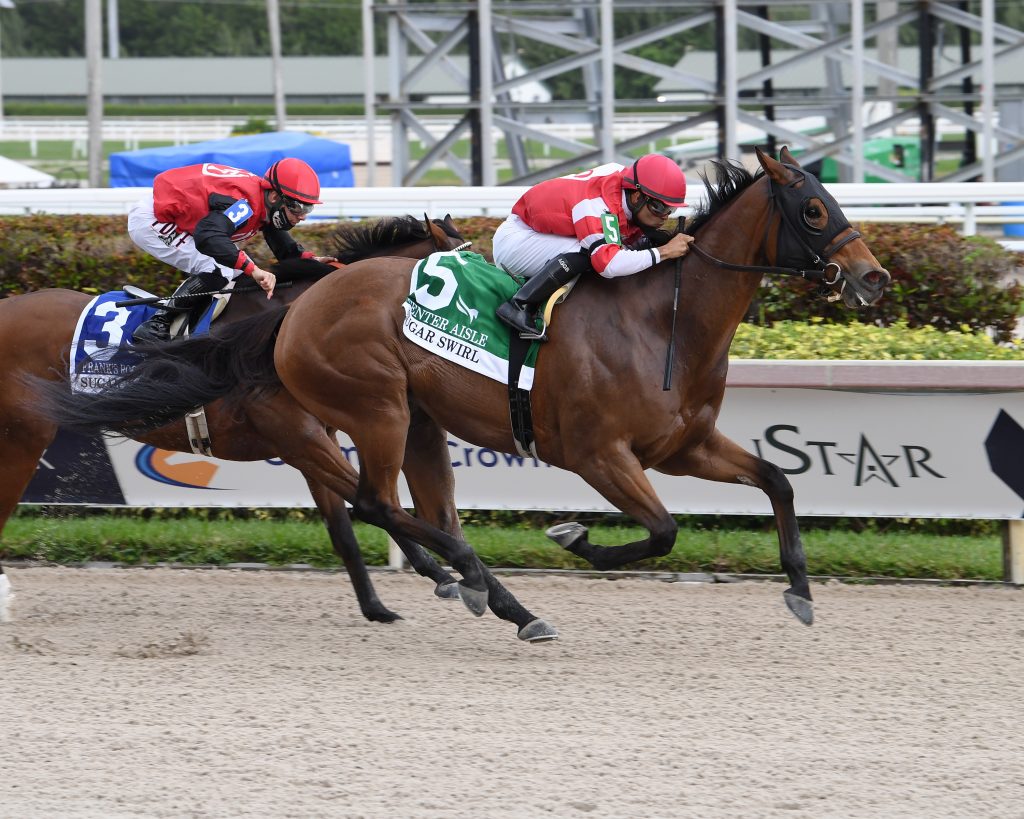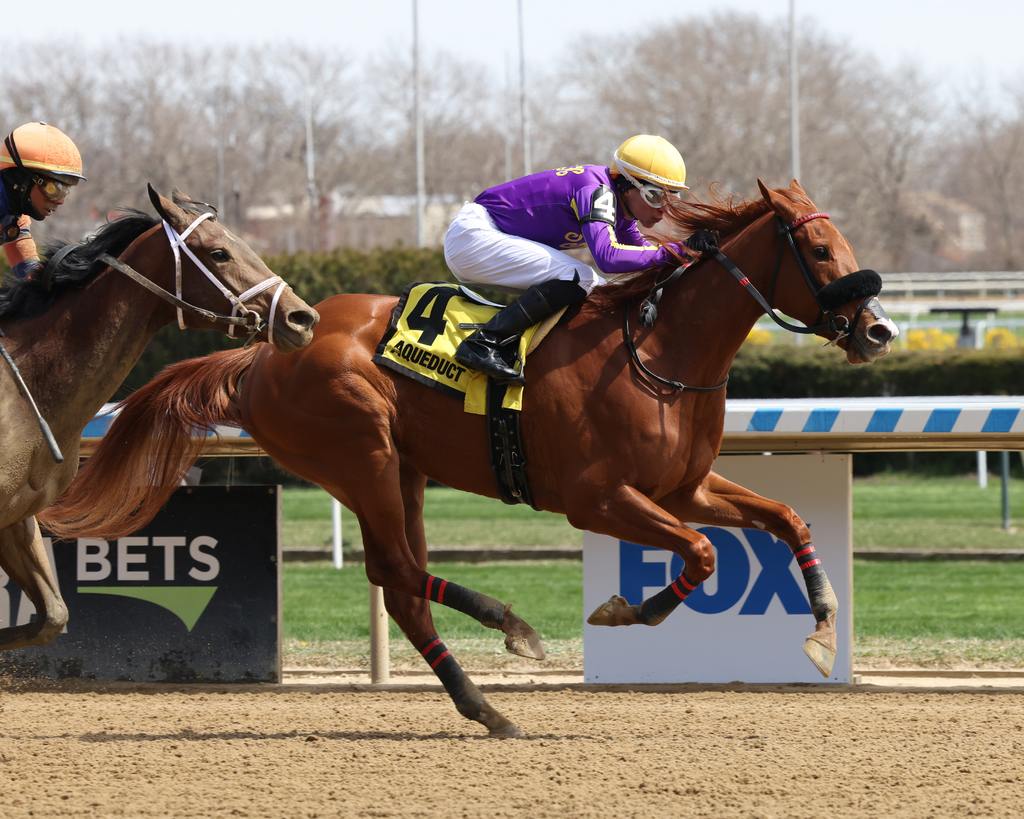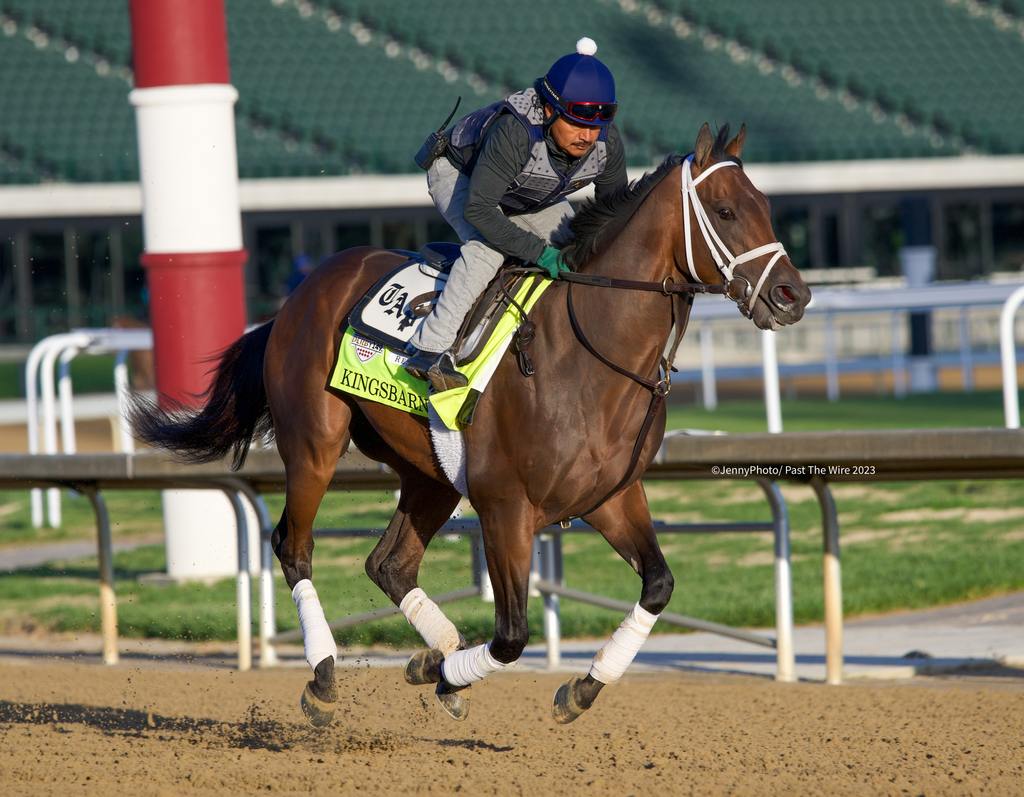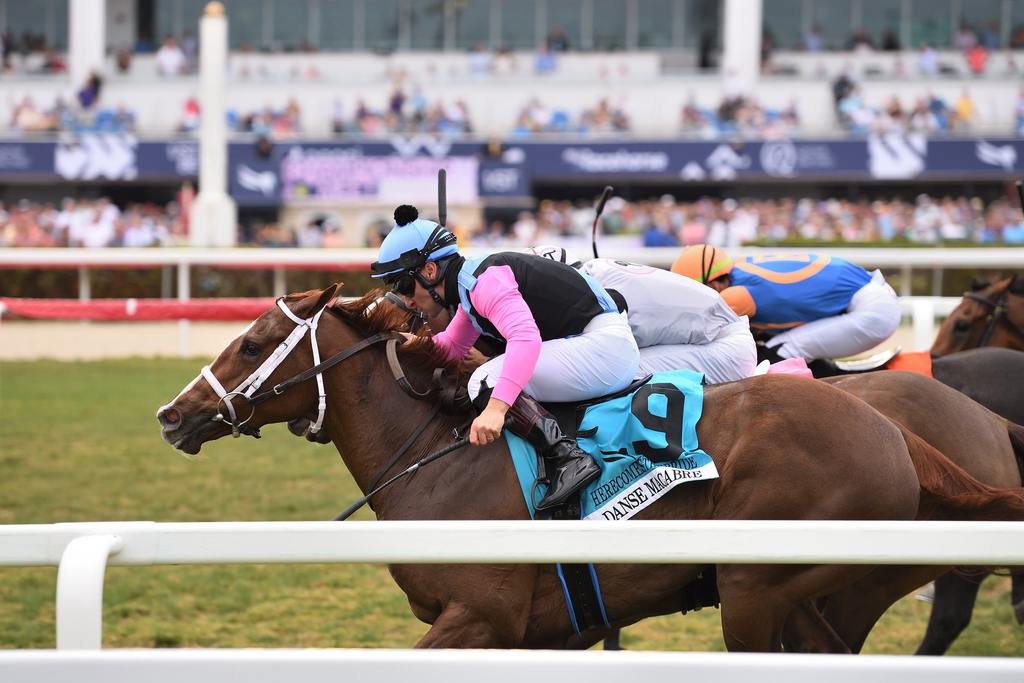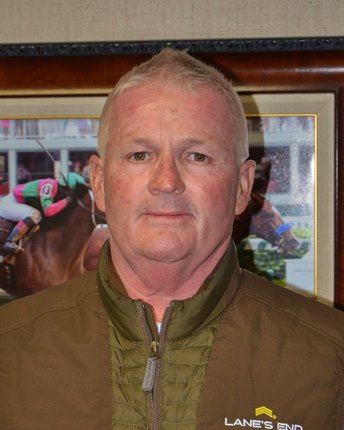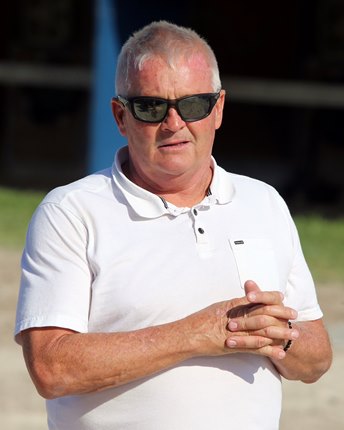
A Place to Hang His Hat and Shingle. (Ben Baugh Photo)
Tom McCrocklin’s steadfast sojourn to success.
By Ben Baugh
Not everyone who’s involved with Thoroughbred racing is born into the industry or has grown up around horses.
Some people follow their passion and achieve dreams through determination, hard work and unwavering persistence. Thoroughbred trainer and 2-year-old consignor Tom McCrocklin is one of those success stories, someone who never gave up, overcoming the pitfalls and adversity that would discourage many, on his quest and commitment to excellence.
School Days
The Louisiana-native graduated from LSU with a business degree in 1982, from Louisiana State University, and went to work for General Motors.
A move to Lafayette, Louisiana, which was about 90 minutes from his hometown of Baton Rouge, would play a pivotal role in what would become his life’s work.
“There’s a little racetrack there (Lafayette) called Evangeline Downs, and on Friday nights, they would have racing,” said McCrocklin. “Every now and then, guys from the office would go to the racetrack to watch racing for entertainment.”
McCrocklin had no history of Thoroughbred racing in his family tree, didn’t have any practical experience with horses, but always loved animals from an early age. The exposure to Thoroughbred racing would open the portal to a new world.
“(Thoroughbred racing) had never even crossed my mind,” said McCrocklin. “At LSU, I remember going on a Saturday to a pizza place, nearby campus, and we watched the Kentucky Derby. My recollection is the year (1981) that Pleasant Colony won the Derby, Johnny Campo. That was really cool. I enjoyed the whole thing. I’ve always been a huge sports fan. I love the competition, the adrenaline, the excitement.”
Thoroughbred racing was now in McCrocklin’s blood, and he found himself with the challenge of how he might be able to become involved with the sport, not having contacts, in the pre-technology, Internet, cell phone, iPad and tablet era, found him in a place that seemed to be frequented more routinely.
“I actually went to the library in Lafayette, and looked up horse racing and education, etc…and found out that there are very few formalized introductions to horse racing,” said McCrocklin. “You kind of grew up in it, your family was in it, or you lived near a racetrack and started working at the track.”
After some thorough research and investigation into what his options might be, to transition from his current vocation to what would become an all-consuming passion and profession, he found a learning institution he would be able to matriculate in that would provide him with a foundation. It was a school in northern Louisiana, Louisiana Tech, which offered a program where a student could receive a Bachelor of Science in animal sciences, specializing in equine studies, with an emphasis on Thoroughbred racehorses.
“They had a little training barn there,” said McCrocklin. “I wasn’t happy with the world I was in workwise, so I said, ‘What the hell.’ I went to Louisiana Tech, already having a finance degree from LSU. I had very little science in my curriculum.”
McCrocklin continued on his academic odyssey, this time obtaining a second degree, a bachelor’s in animal science.
“I got to work in a training barn every morning early and then go to class,” said McCrocklin. “Then go back to work in the training barn in the early afternoon.”
The program provided McCrocklin with the practical experience he needed to start his sojourn, as he had hands-on learning, being taught how to groom, gallop, learn about farrier work, blacksmith work, so he would be prepared for his entry into the world of Thoroughbred racing. He also had the opportunity to work with cows at a dairy farm, and in a meat slab, learning about everything from making hot dogs to milking dairy cows.
The experience provided the aspiring Thoroughbred trainer the chance to learn about a horse before he learned about horse racing, Several claiming horses that campaigned on the racetrack had been donated to the university’s program, providing students with the opportunity to train them and occasionally take them to Louisiana Downs, with some of the seniors in the program taking out their trainer’s license before graduating.
“We took a horse over to Louisiana Downs and won a race,” said McCrocklin. “It was a tremendous thrill. And like most people in horse racing, there’s a lot of truth to that, once you get it into your blood, it’s hard to get it out. You’re either in or your out. You want to devote all of your time and energy to it. The chronicity of it wears you out, and you just prefer to go home and live a 9-to-5 civilian life. I was hooked very much.”
Choosing His Path
When McCrocklin graduated, he had the luxury of choosing what facet of the industry he wanted to be involved in, and in that way, it was very much like the University of Arizona’s Race Track Industry Program.
“You could go into track management, work in the racing office, train to be a steward, be a racing secretary, but I opted for the racing and training side of it,” said McCrocklin. “So, here I am now, I have seven years of college, two degrees, but those things aren’t all that valuable on the backside of a racetrack. They don’t do you much good. I can’t show up at the stable gate at Belmont Park and say that I have two college degrees and that one specializes in racehorses.”
New York State of Mind
His success in academia wasn’t an entrée into the competitive world of Thoroughbred racing, and although he had the credentials on paper, he would have to pay a series of dues in the hardscrabble world of a sport that has far more downs than ups.
“Primarily, I’m over-qualified educationally, and I’m under qualified experience-wise,” said McCrocklin. “I literally left Louisiana Tech, and the first job I had at the racetrack was at Aqueduct.”
McCrocklin began working for veteran horseman, B.G. Dunham, having secured the position in a unique way, that came through his experience in the Louisiana Tech program.
“His (Bob Dunham’s) daughter Sarah, attended the program as well,” said McCrocklin. “She had basically grown up on the backside of the racetrack, and her father said, ‘You’re going to have to get an education.’ So that was her choice to get an education. She said, ‘If you’re going to make me go to school, I’m going to do this.’ When I graduated, she said, ‘You can go work for my dad.’ And I did, as a groom.”
So, McCrocklin’s introduction to Jamaica, Queens, included living in a tack room at Aqueduct. It was a cold, gray winter, one where the sunshine rarely appeared, and there was a period where the horseman questioned himself as to whether or not he really wanted to go forward with the idea of making this his vocation.
However, he literally weathered the storm, making the most of the opportunity in the less than hospitable environment. He eventually left Aqueduct for Elmont, N.Y. at Belmont Park, but not as a foreman or an assistant trainer, but still in the capacity of being a groom. But it was there he had the chance to work for H. Allen Jerkens and D. Wayne Lukas.
Beantown Bound
Preparation finally met opportunity, when an owner reached out to Louisiana Tech, after reading an article in the Blood-Horse about the program, in search of a horseman who might be able to make a difference in his string of horses at the racetrack.
“There was a man from Boston, a racehorse owner named Charles Matses, he called the school, saying that he was frustrated, and had horses at Rockingham Park and Suffolk Downs,” said McCrocklin. “He asked the school if they had any graduates that he could potentially hire as a private trainer.”

A phone call to McCrocklin, would lead to him being put on a plane and flying from New York to Boston, where he was picked up at Logan Airport by Matses and interviewed by his prospective employer. The two parties went back-and-forth, and eventually the owner made the decision to hire McCrocklin for the position as his private trainer. However, it was an eye-opening experience, with a number of unanswered questions, something that would test his confidence.
“It was overwhelming for me at the time,” said McCrocklin. “I had all this education, but at this point (in my career) I had only been a groom. The reality was I didn’t know how to train a horse, and at that point, I was under qualified to be a fulltime trainer.”
But McCrocklin was undeterred and determined to make a go of it, understanding the significance of the opportunity, and those initial experiences in New England provided him with a broader base, and would become the cornerstone of a steadfast commitment that would be his destiny.
“I took on the challenge. I remember shipping into New England, it’s less expensive racing (than in New York), and he had quite a bit of money. I remember going into Rockingham Park, bedding my horses on three feet of straw and having big fat hay nets. My neighbors next to me had their horses standing on the ground and digging holes. It was interesting. Everyone thought I was some rich kid that came from wealth and thought I could afford to do all this. When in fact., this is how I wanted to treat my horses. I wanted to do it the right way.”
The fact that McCrocklin had worked for Allen Jerkens and Wayne Lukas provided him with the unique perspective, and by having been around good horses and good trainers, he had a solid understanding of how to treat his horses properly.
“I didn’t believe in doing it any other way,” said McCrocklin. “I still don’t believe in doing it any other way. You give the horse everything they need, and if they can run, they’ll pay you back.”
The cooler temperatures on a circuit, when there was still year round racing, was less than desirable, but McCrocklin would send sets out each morning, despite the hardships brought on by the inclement weather.
“I remember days in New England, where I was literally the only guy on the racetrack training,” said McCrocklin. “Nobody else was stupid enough to go on the track. I was hard-headed, and I was like, my horses are going to train.”
However, it wasn’t just the environment, it was the way of life, customs and conventions that were part of the daily routine in a different part of the country, McCrocklin never fully adjusted to.
“They were very cold winters, and a being a kid from Louisiana, I wasn’t really prepared for that,” said McCrocklin. “The truth is, I was never really happy in New England. You may as well be in a foreign country. The cultures in Baton Rouge , Louisiana and Boston Massachusetts are worlds apart. I was always a fish out of water there.”
Time for a Change
However, the experience did have its benefits, but there were other variables in the equation that made the process less appealing, and McCrocklin didn’t see himself evolving any more than he already had. He was ready for a change.
“It’s where I learned to train horses,” said McCrocklin. “I learned to train cheap horses, sore horses, I never had any real good horses up there. Once in a while I would get a decent horse. I trained up there until 1991, 1992, and the financial reality of training horses in Boston, on a cheap circuit, you can’t make a living. You’re getting by is all your doing.”
It became apparent, that if he were to have stayed in New England, he would have met the same fate as many of the other conditioners he shared the backside with, something he couldn’t see himself doing for a sustained period, understanding the economic actuality of the situation, and the consequences if he were to remain in a place that didn’t seem to offer any prospects.
“I’d look around me and see guys who’ve been around for 20, 30, 40 years, and they’re not doing any good,” said McCrocklin. “I was never really a forward thinker, thinking about my future, but I was smart enough to realize, you’re not going anywhere training horses in Boston.”
Sunny Florida Beckons
McCrocklin found himself on the move again, but this time he would be returning to a warmer climate, leaving the cooler temperatures and the gray skies of the northeast for the sunshine state, but his entrée into Marion County, was far from being seamless, and he found himself back in a role that he had great familiarity with, making his bones in an industry renowned for its unforgiving nature was becoming commonplace.
“My last winter up there, I realized that I was cold, tired, broke and was ready to get out of there,” said McCrocklin. “I really didn’t have a plan, didn’t know where I was going or what I was going to do. I worked for Allen Jerkens at the farm, and he trained for Hobeau Farm, who had a farm in Ocala.”
Jerkens placed a call to Hobeau’s farm manager, Craig Wheeler, but things didn’t go the way McCrocklin had hoped, and he found himself in the unenviable position of not having a place to land, it was a difficult learning experience, but the transition to Ocala, would be the correct one, his destiny, although at the time it seemed as if he had taken several steps backward.
“I called Craig, and you think the way the story is going to go, Tom went to Work at Hobeau Farm,” said McCrocklin. “I think the reality at that point , I was a threat. Here’s this kid, he’s young, upwardly mobile, two college degrees, he’s worked for The Chief (Allen Jerkens), got the thumbs up, he’s got the reference call. It became readily apparent that Craig didn’t have a spot for me. Looking back on it now, the reality is, you just can’t show up in Ocala and say, ‘I want to be a farm manager.’ In retrospect, the bottom line was I had more dues to pay. I had paid dues, but I hadn’t paid enough dues.”
Humility and Opening Doors
The transition to Ocala was very humbling, McCrocklin found himself grooming horses again, this time at a farm and not on the backside of a racetrack, earning $250 a week. He found himself living in the spare room of somebody’s house, yet he was determined, and despite having a fulltime job as a groom, he took on additional side jobs, mowing fields and sale prepping yearlings in the evening. His work ethic played a pivotal role as he pursued his passion and dream.
“I wasn’t afraid to work, in fact, I loved to work,” said McCrocklin. “I love the game. I was just grinding away, and eventually, one owner that I knew from New York, from years earlier, called me. He said, ‘I’ve got a yearling and I’d like it broke. Can you do it?’ The reality was I had been at the racetrack for many years, but I had never broke yearlings. The truth was, I really didn’t know how to break a yearling. But of course I faked it, and said, ‘I’ll break a yearling.”
The owner sent the filly to McCrcoklin, and with some qualified help, he was able to get the job done, with the graduate going on to Belmont Park and breaking her maiden first time out.
“It’s been 30 years of stacking one hard day’s work on top of another,” said McCrocklin.
It’s been McCrcoklin’s approach to work, humility and positive attitude as well as his willingness to increase his knowledge about the industry at every opportunity that has allowed him to survive in a competitive environment, where there’s very little margin for error.
“There’s no secrets, I didn’t hit the lottery, I don’t have some rich uncle that left me a lot of money,” said McCrocklin. “I just really paid a lot of dues. I was always a sponge, wanted to learn. I listened to veterinarians and blacksmiths and would go to the library back in the day to read books on lameness, anatomy, veterinary work, training principles, and of course now because of technology, we have the Internet, Google, YouTube and everything is so accessible. But back when I was learning, it wasn’t just the day-to-day working with horses, if you were open-minded, they would teach you a lot.”
Patience Leads to Prosperity
With that initial achievement, and over time, McCrocklin developed and established a breaking and training operation in Ocala. The early stages of his program saw his numbers increase exponentially from 12 to 24 and eventually 36. But the road to success was anything but easy, it was a far cry from a meteoric rise.
“I can remember being overwhelmed,” said McCrocklin. “Logistically, it was very overwhelming, the money, going from being a hands-on guy, to making payroll, paying bills, and going through periods where my credit cards were maxed out. I couldn’t make the rent payment, and all the hard luck stories that horsemen go through.”
However, it was through the horseman’s perceptive and discerning eyes, that he soon came to realize, some trainers were doing far better financially than others, and it was one specific facet of the industry that seemed to be enjoying this type of windfall.
“I just remember noticing over the years in Ocala, by looking around, all the guys that had the money were selling 2-year-olds,” said McCrocklin. “We’re talking many years into the process. I started out very modestly buying some cheaper yearlings, turned them around and sold them as 2-year-olds, and I was terrible. The first few years didn’t go well. The horses didn’t breeze well. I kind of took on this mentality that I’m not very good at this. I never gave up. I just kept grinding away, and as time went on, I got more financial backing as in partners and investing.”
However, when success came, it did so in a prosperous way, and McCrocklin has achieved an impressive accomplishment, defining him as a horseman, as for the past six years, he’s sold at least one horse for more than seven figures, putting him in rare company among 2-year-old consignors.
“It’s very hard to sell a horse for a million dollars at any level, and to do it multiple years in a row, in this environment is very gratifying,” said McCrocklin. “There’s been a lot of hard work that’s gone into it. I don’t count the days and I don’t count the hours, and most days, I don’t count the money. I don’t really think about the money, unless I don’t have enough.”
Center Aisle, a daughter of Into Mischief, a graduate from McCrocklin’s program, brought $1.5 million at the 2019 Gulfstream Sale. The filly went onto capture the Grade Three Sugar Swirl Stakes at Gulfstream Park in 2021.
A Date at Churchill Downs
His patience and skillset are paying huge dividends, with the underpinnings from years of experience coming full circle with several of his latest prospects racing in elite company.
“It’s a very exciting year for me because a horse that I bought as a yearling and sold at Fasig-Tipton last March at Gulfstream, Kingsbarns is an undefeated 3-year-old,” said McCrocklin. “He’s 3-3. He won the Louisiana Derby easily and he’s going to run in the Kentucky Derby. The filly that I own, Promiseher America, she won the Gazelle last Saturday (April 8) and she’s going to run in the Kentucky Oaks. I’m very proud of my horses and proud of the achievement.”
Kingsbarns, a son of Uncle Mo is trained by Todd Pletcher, and races in the silks of Spendthrift Farm, LLC. The lightly raced bay colt, broke his maiden in January at Gulfstream Park, won an allowance race at Tampa Bay Downs in February before his win in the Twinspires.Com Louisiana Derby (Gr.2).
Promiseher America is a daughter of the 2015 Triple Crown winner American Pharoah and is conditioned by Raymond Handal. The chestnut filly is owned by Hoffman Thoroughbreds and Tom McCrocklin and was bred by Robert and Lawana Low. She broke her maiden in February at Aqueduct and won the Gazelle Stakes (Gr. 3) less than seven weeks later by a half-length, as the longest shot on the board in the field of six horses.
Success Stories and Important Relationships
The horseman has had a longtime relationship with owners Robert and Lawanna Low, and continues to break and train their homebreds, the ones that aren’t sold as yearlings.
“The filly that I own half of; the Lows bred her,” said McCrocklin. “We’ve had some nice horses together. I went to the (Kentucky) Derby when they had Steppenwolfer, he ran third to Barbaro. We had a filly Real Cozy, who ran second in the Juddmonte Oaks to a filly named Flute. We had a really fast filly named Capote Belle that won The Test, who got beat by a nose in the Ballerina. They’re great people and have enjoyed a lot of success in the game.”
McCrocklin continues to be involved with Little Red Feather Racing, where he serves in the capacity of a consultant and advisor.
“I try to bring a lot of advice to the table, when they get into situations with horses, trainers or veterinary issues.”
All-Time Favorite
After nearly four decades in the business and countless stakes winners and success stories, there is one horse that remains McCrocklin’s favorite after years of conditioning horses, the daughter of a multiple Grade One winner Capote, who went on to win or place in 18 of her 22 starts, scoring six stakes’ victories, three of them graded en route to earning $603,315.
The bay mare’s stakes scores included wins during her sophomore campaign in the Grade Two Prioress, her third start at Belmont Park; the Test Stakes at Saratoga (Gr. 1); as a 4-year-old in the Northern Spur Stakes at Oaklawn Park; the Humana Distaff Handicap (Gr. 3) at Churchill Downs and a pair of stakes during her 5-year-old campaign at Oaklawn Park, the American Beauty Stakes and Spring Fever Stakes. Capote Belle was conditioned by Danny Peltz and campaigned by Robert Low. The Frances A. Genter Stable bred the multiple stakes winner.
“Capote Belle is still my favorite horse from over the years,” said McCrocklin. “She was a big filly, imposing physical horse and she was brilliantly fast. I still remember Tom Durkin’s call during the Test. She went a half-mile in 43 (seconds) and change, and three quarters-of-a-mile in 1:07 and change. She ran 7/8ths in 1:20 and a couple, and at the time it was a stakes record for the Test (1996, 1:21:08, equaling the stakes record).
There are several horses from McCrocklin’s program that have distinguished themselves recently, bringing added and well-deserved attention to the trainer who continues to produce optimal results with a commitment to excellence.
Fecundity Over Flaws
A filly named Danse Macabre is among those who’ve become standouts. Bred by St. Elias Stables, the chestnut daughter of Army Mule is conditioned by Kelsey Danner. In Danse Macabre’s most recent start she won the Herecomesthebride Stakes (Gr. 3) at Gulfstream Park, by a head with regular rider Adam Bechizza in the irons. She’s never finished out of the money in six lifetime starts and won the Ainsworth Untapable Stakes at Kentucky Downs as a juvenile last year. Danse Macabre races in the silks of NBS Stable and Elements Racing, LLC.
“She worked really fast at OBS, in 2 4/5ths (for a quarter-of-a-mile),” said McCrocklin. “She was offset in her knees, and we had very little interest in her. I stood outside of my consignment, just banging my drum, saying, ‘you need to buy this filly, she’s a really nice filly.’ She didn’t have great conformation in front, but she was very honest, fast and sound, and is still all three of those things.”
Capricious Tastes
The auctions can be challenging, and each year prospective buyers might be looking for a particular type of athlete, but McCrocklin is a big believer in knowing one’s horses and understands you’re not going to talk someone into purchasing a racing prospect.
“I’m not a big talker at my consignment,” said McCrocklin. “If you have questions, I’ll answer them. I kind of figured it out a long time ago, if I go into a shoe store, you’re not going to talk me into a buying a particular pair of shoes. I’m going to buy what I like. People are pretty much the same with horses, and rightfully so and they have their own opinions. I get it.”
McCrocklin even checks out the Fasig-Tipton auctions on both coasts—(left) Santa Anita in 2019 and (right) Midlantic in Timonium, Md., in 2018. (left: Fasig-Tipton photo/right: Photo by Z)
Fantastic Find
One of McCrocklin’s first interactions with Little Red Feather Racing, saw him be involved with the purchase of a diminutive gray filly in the OBS August Yearling Sale, from the consignment of Janie Roper for $12,000.
Bred by Centaur Farm, Egg Drop was conditioned by Mike Mitchell, and started 13 times, finding the winner’s circle six times, and ran in the money five more times, three seconds and two thirds, while bankrolling $534,020. The filly who was out of the adhocracy mare Rehocracy, Egg Drop went onto score three consecutive graded stakes scores during her 4-year-old campaign, the Grade Two Yellow Ribbon in September at Del Mar, the Goldikova Stakes (Gr. 2) at Santa Anita in November and the Florida-bred would finish her year by winning the Grade One Matriarch Stakes at Betfair Hollywood Park. She would eventually sell in foal to Tapit for $1.9 million, having been purchased by Bridlewood Farm.
“I was like, ‘who wants an Alphabet Soup filly for $12,000 at OBS open sale,’” said McCrocklin. “I really liked her.”
McCrocklin’s experience, knowledge, acuity and eye for a horse found him making an interesting purchase, a filly that seemed to be beyond his means, but one that he was determined to sign the ticket for, and it proved to be a wise investment.
“It was at the OBS June Sale, and I bought a Trippi filly for $42,000,” said McCrocklin. “Her breeze wasn’t particularly fast, but I really liked the filly. She was from the very end of Tartan Farm and had all that pedigree in her family. Her pedigree was very interesting because she was inbred to (Hall of Fame inductee) Ta Wee. That Rasmussen factor, that inbreeding to superior females, it can be very potent at times.”
The filly was Miss Macy Sue, Trippi-Yada Yada, Great Above, who was bred by Bryan Howlett, campaigned by Roll Reroll Stable, Inc., Dennis Albaugh and William Gessman. McCrocklin purchased the dark bay daughter of Trippi from the consignment of Tony Everard’s New Episode Training Center.
Miss Macy Sue would go onto win four consecutive stakes races during her career, the Carousel Stakes at Oaklawn, the Prairie Rose Stakes at Prairie Meadows, the Winning Colors Stakes (Gr.3) at Churchill Downs and Saylorville Stakes at Prairie Meadows and would later capture the Presque Isle Masters Stakes at Presque Isle Downs during her 4-year-old campaign. She would repeat her success the following year with a victory in the Saylorville Stakes. The mare earned $880,915 but is more renowned for being the dam of champion Liam’s Map and graded stakes winner Not This Time.
“So, I buy this filly for $42,000, I have nowhere close to $42,000 in my bank account, it was one of those, I’ll figure it out,” said McCrocklin. “Long story short, I bought her, we got her home, trained her and really liked her. She was very temperamental and a very difficult horse to deal with. I wound up selling her to some people from Iowa named Albaugh. She ended up being an unbelievable broodmare and is the dam of Not This Time and Liam’s Map. I bought her out of the June OBS Sale.”
A Lifetime of Work and Commitment
McCrocklin’s program is a product of hard work, consistency, one that’s time-tested and that he thoroughly believes in.
“It’s being on the job every day because if you’re not, you’re not going to get it done,” said McCrocklin. “It’s a farmer’s lifestyle. At the end of the day, we’re farmers and that’s how we live. It’s a grind.”

And it’s that chronicity, finding oneself at the barn seven days a week, during the holidays and routinely at off hours that can present its own series of challenges, but it’s something that horseman like McCrocklin take in stride, knowing that it comes with the territory.
“Christmas, Thanksgiving, New Years,” said McCrocklin. “I have owners who call me on Christmas and say, ‘How’s your Christmas going?’ I’m at the barn taking care of horses. Horses don’t know it’s Christmas. It’s a lot of sacrifice, but it’s exponentially more rewarding to me than the sacrifice. And don’t overthink it. You can screw yourself into the ground, thinking about how hard it is. You’re either going to do it or you’re not. You can’t do it half-way.”
It’s that work ethic and steady approach, and having the discipline to stay focused that keeps McCrocklin humble. Humility, integrity and understanding the adversity and pitfalls of the industry play a large role in the success of his operation.
“I’m always surprised (by the success), and I’m a guy who’s always fearful, that if you don’t keep doing the right thing, you can always end up right back where you started,” said McCrocklin. “I never take anything for granted. I’m never arrogant about it and am very appreciative, and I don’t like to use the word lucky, it’s not luck. It’s hard work.”
Climbing the Steep Learning Curve
It’s been an evolution process for McCrocklin, whose progress is not only measured by his program’s success, but by his longevity, positive approach and thirst for knowledge, but mostly it’s his passion for all facets of the Thoroughbred industry.
“I’m not big on stopping and reflecting, but when I do, from where I started and where I am (now), it’s pretty amazing,” said McCrocklin. “I continue to try to learn. I watch horses and I’m a student of the game. I love handicapping and betting on them, and everything about it.”
A Place to Hang His Hat and Shingle
Marion County has been the place where McCrocklin has been a denizen for the past 30 years, but still has a fondness for the locale that he spent his formative years.
“Ocala is home,” said McCrocklin. “I think when you grow up anywhere to some degree that always feels like home. I never get back to Louisiana. I’m a huge college sports fan and college football fan. I basically grew up right outside the stadium (in Baton Rouge). I go into mourning when the college football season ends. I just really live it and I’m entertained by it. Then I just shift over to horseracing. Ocala is a great place to live. It’s changed a lot (over time). My home is with the horses.”




